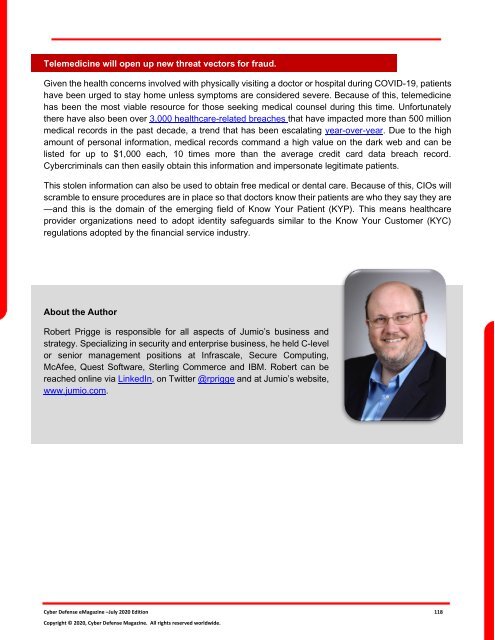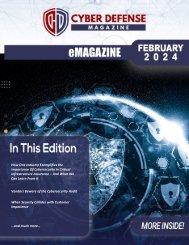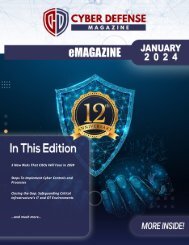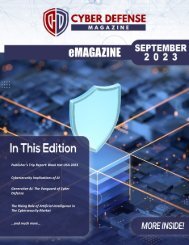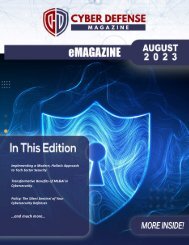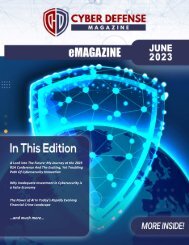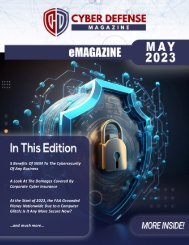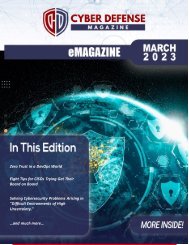Cyber Defense eMagazine July 2020 Edition
Cyber Defense eMagazine July Edition for 2020 #CDM #CYBERDEFENSEMAG @CyberDefenseMag by @Miliefsky a world-renowned cyber security expert and the Publisher of Cyber Defense Magazine as part of the Cyber Defense Media Group as well as Yan Ross, US Editor-in-Chief, Pieruligi Paganini, Co-founder & International Editor-in-Chief, Stevin Miliefsky, President and many more writers, partners and supporters who make this an awesome publication! Thank you all and to our readers! OSINT ROCKS! #CDM #CDMG #OSINT #CYBERSECURITY #INFOSEC #BEST #PRACTICES #TIPS #TECHNIQUES
Cyber Defense eMagazine July Edition for 2020 #CDM #CYBERDEFENSEMAG @CyberDefenseMag by @Miliefsky a world-renowned cyber security expert and the Publisher of Cyber Defense Magazine as part of the Cyber Defense Media Group as well as Yan Ross, US Editor-in-Chief, Pieruligi Paganini, Co-founder & International Editor-in-Chief, Stevin Miliefsky, President and many more writers, partners and supporters who make this an awesome publication! Thank you all and to our readers! OSINT ROCKS! #CDM #CDMG #OSINT #CYBERSECURITY #INFOSEC #BEST #PRACTICES #TIPS #TECHNIQUES
You also want an ePaper? Increase the reach of your titles
YUMPU automatically turns print PDFs into web optimized ePapers that Google loves.
Telemedicine will open up new threat vectors for fraud.<br />
Given the health concerns involved with physically visiting a doctor or hospital during COVID-19, patients<br />
have been urged to stay home unless symptoms are considered severe. Because of this, telemedicine<br />
has been the most viable resource for those seeking medical counsel during this time. Unfortunately<br />
there have also been over 3,000 healthcare-related breaches that have impacted more than 500 million<br />
medical records in the past decade, a trend that has been escalating year-over-year. Due to the high<br />
amount of personal information, medical records command a high value on the dark web and can be<br />
listed for up to $1,000 each, 10 times more than the average credit card data breach record.<br />
<strong>Cyber</strong>criminals can then easily obtain this information and impersonate legitimate patients.<br />
This stolen information can also be used to obtain free medical or dental care. Because of this, CIOs will<br />
scramble to ensure procedures are in place so that doctors know their patients are who they say they are<br />
—and this is the domain of the emerging field of Know Your Patient (KYP). This means healthcare<br />
provider organizations need to adopt identity safeguards similar to the Know Your Customer (KYC)<br />
regulations adopted by the financial service industry.<br />
About the Author<br />
Robert Prigge is responsible for all aspects of Jumio’s business and<br />
strategy. Specializing in security and enterprise business, he held C-level<br />
or senior management positions at Infrascale, Secure Computing,<br />
McAfee, Quest Software, Sterling Commerce and IBM. Robert can be<br />
reached online via LinkedIn, on Twitter @rprigge and at Jumio’s website,<br />
www.jumio.com.<br />
<strong>Cyber</strong> <strong>Defense</strong> <strong>eMagazine</strong> –<strong>July</strong> <strong>2020</strong> <strong>Edition</strong> 118<br />
Copyright © <strong>2020</strong>, <strong>Cyber</strong> <strong>Defense</strong> Magazine. All rights reserved worldwide.


